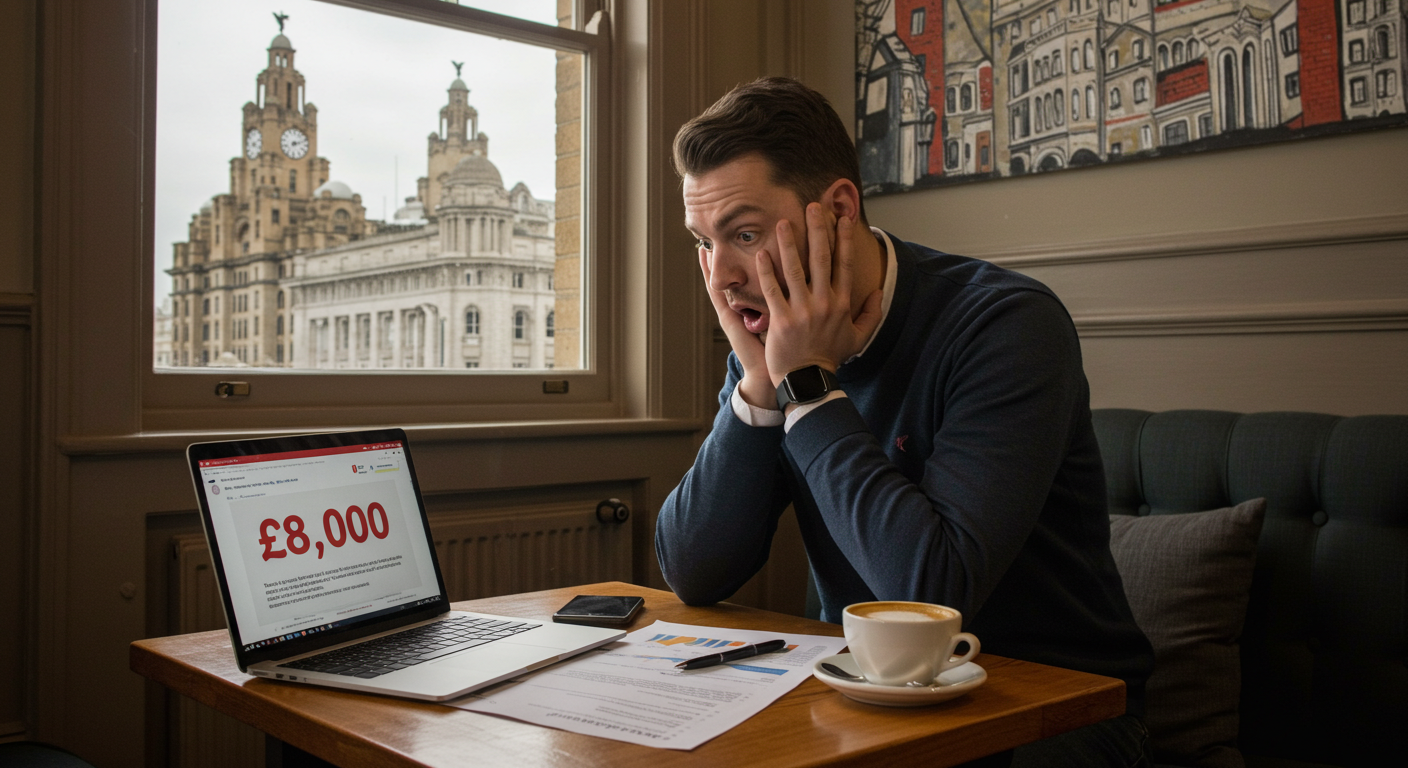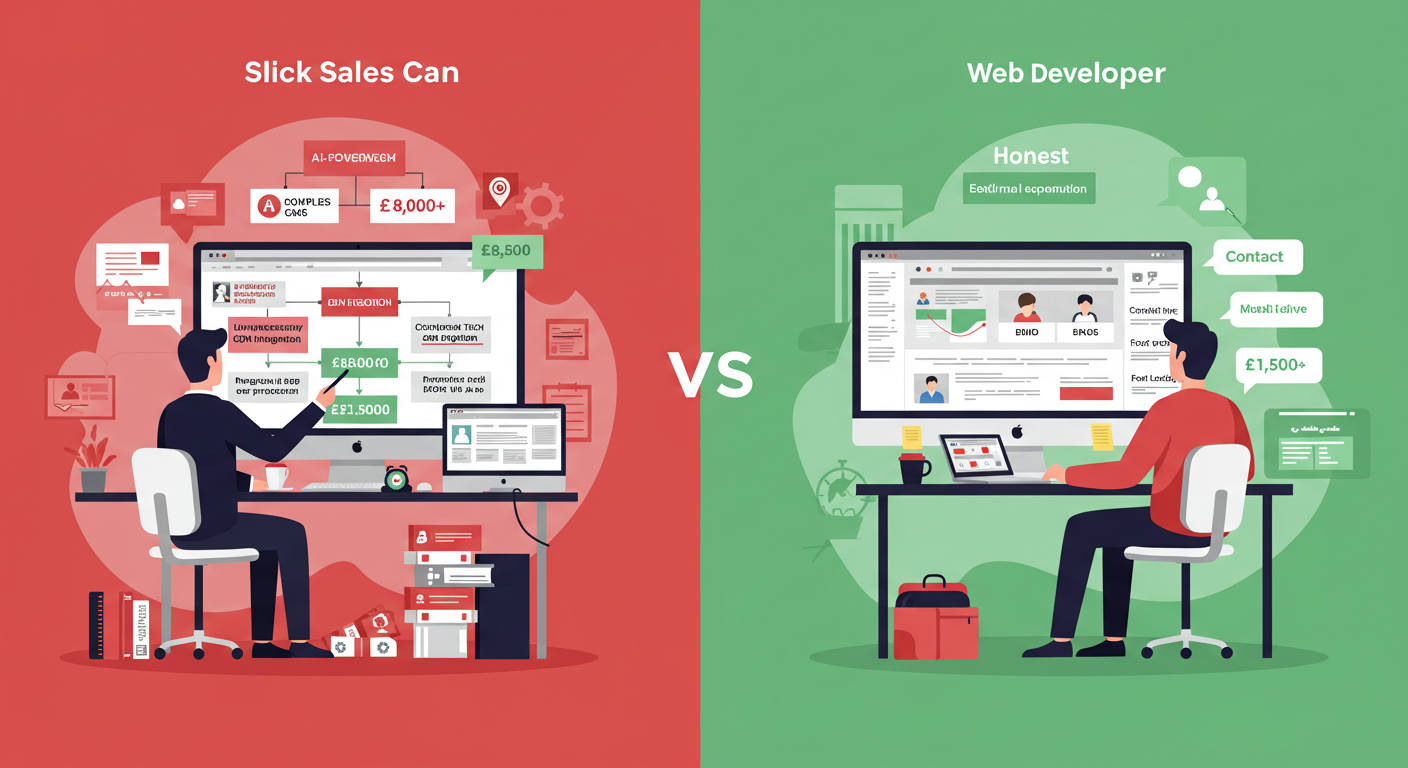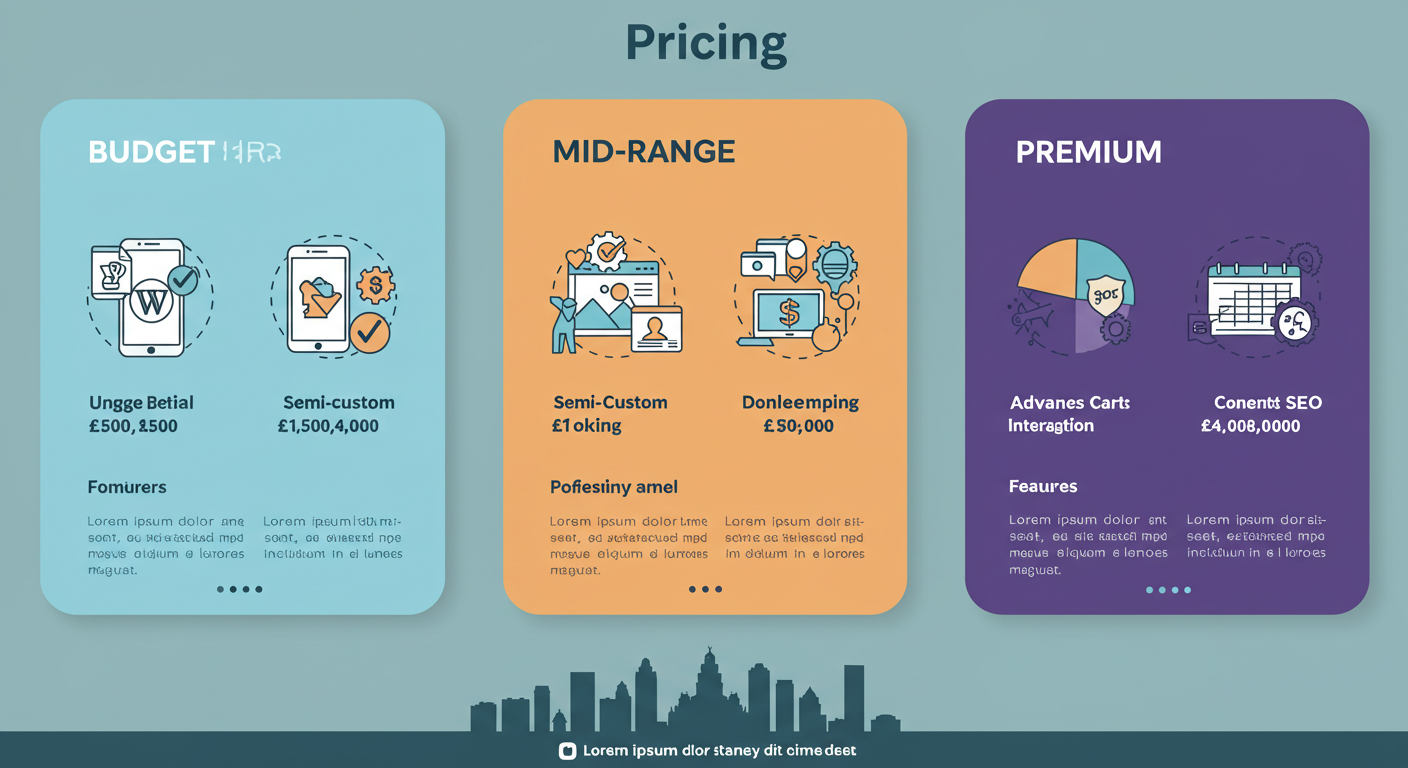Small Business Website Design Liverpool: What You Actually Need (Not What Agencies Want to Sell You)
Honest advice for time-poor Liverpool business owners who just want a website that works

Picture this: You own a lovely little cafe in Woolton. Business is good. You finally decide it’s time to get a proper website. You contact a “professional” web design agency in Liverpool.
They send back a quote: £8,000.
For a website. For your cafe. That serves bacon butties and flat whites.
The proposal mentions “AI-powered customer journey optimization,” “enterprise-level CMS integration,” “dynamic content delivery networks,” and something called “progressive web app architecture.”
You don’t need any of that. And they know it.
Look, I get it. You’re not a tech person. You just want customers to find you online, see your menu, maybe book a table. But the web design industry has a dirty little secret: the more confused you are, the more they can charge you.
So let’s cut through the nonsense. Here’s what you actually need for your small business website in Liverpool, what you’re being oversold, and how to avoid getting ripped off.
What You ACTUALLY Need (The Real Essentials)
If you’re a small business in Liverpool—whether you’re running a salon on Lark Lane, a plumbing business in Fazakerley, or a boutique on Bold Street—your website needs are probably simpler than you think.
The Non-Negotiables:
- A homepage that explains what you do – In plain English. Not marketing waffle. Just “We’re a family-run Italian restaurant in Aigburth serving fresh pasta since 2015.”
- Your contact information – Phone number, email, address. Sounds obvious, but you’d be amazed how many “beautifully designed” websites hide this.
- Mobile responsiveness – About 70% of your customers will visit on their phone. If your site looks rubbish on mobile, you’re turning away business.
- Basic SEO setup – Page titles, descriptions, headings. Nothing fancy. Just enough so Google knows you exist and what you do.
- Fast loading – Nobody waits more than 3 seconds for a website to load. Not even for your award-winning scouse.
- An about/services page – Tell people what you offer and why they should choose you.
The Genuinely Useful Extras (Depending on Your Business):
- A contact form – So customers can reach you without picking up the phone (some people hate phone calls).
- Google Maps integration – Makes it dead easy for people to find you. Especially useful for Liverpool businesses off the beaten track.
- A gallery or portfolio – If you’re a hairdresser, photographer, or builder, show your work. Pictures sell.
- Opening hours – Please, for the love of all that’s holy, put your opening hours on your website. Liverpool folk are busy and don’t want to ring just to ask if you’re open on Sundays.
- Customer testimonials – A few genuine reviews build trust. No need for a complex review system—just screenshot some Google reviews.
That’s it. Really. If you’ve got those basics sorted, you have a functional, professional small business website.
What Agencies Try to Sell You (And Why You Don’t Need It)

Right, here’s where it gets interesting. Let’s talk about the stuff agencies will insist you “absolutely must have” for your website.
| Feature They’re Selling | What It Actually Is | Do You Need It? |
|---|---|---|
| Custom CMS | A bespoke system to update your content | UNNECESSARY – WordPress does the job for 99% of small businesses |
| E-commerce Platform | Online shop functionality | MAYBE – Only if you’re actually selling products online |
| AI Chatbot | Automated customer service robot | UNNECESSARY – Just put your phone number on the site |
| Advanced Analytics | Detailed visitor tracking | UNNECESSARY – Free Google Analytics tells you everything you need |
| CDN Integration | Makes your site load faster globally | UNNECESSARY – Your customers are in Liverpool, not Lagos |
| Progressive Web App | Website that works like an app | UNNECESSARY – Nobody’s installing your cafe’s “app” |
| Multi-language Support | Website in multiple languages | UNNECESSARY – Unless you’re actually targeting foreign markets |
| Booking System | Online appointment scheduling | MAYBE – Useful for salons, restaurants, services |
Pro Tip: The Agency Markup Game
Here’s something agencies won’t tell you: many of those “custom solutions” they’re charging £2,000+ for? They’re actually just WordPress plugins that cost £50. The agency installs it, slaps a massive markup on it, and calls it “bespoke integration.”
I’m not saying all agencies do this, but enough do that you should ask: “Is this a custom build or an existing plugin/solution?”
If they dodge the question, you have your answer.
Red Flags in Web Design Quotes
You’ve got quotes from three different Liverpool web design agencies. How do you spot the dodgy ones? Watch for these warning signs:
What to Expect to Pay (Honest Pricing Breakdown)

Right, let’s talk actual numbers. What should a small business website actually cost in Liverpool?
Budget Option (£500-£1,500)
Good for: Very small businesses, startups, basic brochure sites. You’ll get a professional-looking website that does the job. It won’t be unique, but it’ll work.
Mid-Range Option (£1,500-£4,000)
Good for: Established small businesses who want something more tailored. You’ll get custom design elements, better functionality, and proper content strategy.
Premium Option (£4,000-£8,000)
Good for: Businesses with specific, complex needs. Online shops, businesses with booking systems, sites requiring custom databases or integrations.
Anything over £8,000? You’d better be running a significant operation with genuinely complex requirements. For most Liverpool small businesses, this is overkill.
The Dirty Secret About Pricing
Many agencies base their pricing not on the actual work required, but on how much they think you can afford to pay. A plumber might get quoted £2,000 for a basic site, while a solicitor gets quoted £6,000 for the exact same work—because agencies assume solicitors have bigger budgets.
Always get multiple quotes. And don’t tell agencies what your budget is until you’ve seen their pricing.
The Real Story: A Liverpool Business That Got Stung
The £12,000 Gym Website
A friend of mine runs a small gym in Wavertree. Lovely place, about 150 members, personal training, classes, the works.
He got talked into a £12,000 website by a Manchester agency (should’ve kept it local, mate). They promised him “cutting-edge booking integration,” “member portal with AI-powered workout planning,” and “social media auto-posting.”
What he actually got:
- A WordPress site with a premium theme (retail price: £60)
- A booking plugin (£200/year)
- A “member portal” that was just password-protected pages (built-in WordPress feature: free)
- The “AI workout planner” was a third-party app embed (free)
- Social media auto-posting that never worked properly
The kicker? A Liverpool developer later told him the whole thing could’ve been built for £2,500. He’d paid nearly five times what the work was worth.
Don’t be my mate. Ask questions. Get second opinions. Trust your gut when something feels overpriced.
Questions to Ask Before Hiring Anyone
Before you sign any contract or hand over any money, ask these questions. The answers will tell you everything you need to know:
- “Can you show me three websites you’ve built for Liverpool businesses similar to mine?” – If they can’t, they might not understand your market or needs.
- “What platform will you build this on, and why?” – There should be a clear, understandable reason. “Because it’s what we always use” isn’t good enough.
- “Who will own the website, domain, and all content after completion?” – The answer should be “you will.” Anything else is a red flag.
- “What exactly is included in ongoing maintenance, and what does it cost?” – Get specifics. “Website maintenance” is vague. “Monthly security updates, backup management, and 1 hour of content changes” is clear.
- “Can I update the website myself, or do I need to pay you for every change?” – You should be able to make basic updates yourself. If they say no, they’re creating dependency.
- “How long will the project take, and what’s the process?” – A proper timeline shows they’ve thought it through. “A few weeks, depends on you” is unprofessional.
- “What happens if I’m not happy with the design?” – Understand the revision process upfront. Unlimited revisions sounds great but usually isn’t practical. 2-3 rounds is standard.
- “Is this a custom build or using existing themes/plugins?” – Neither answer is wrong, but you should know what you’re paying for.
- “What’s your refund policy if the project doesn’t work out?” – Protects both parties. Be wary of “all payments non-refundable.”
- “Can you provide references from other Liverpool clients?” – Any established designer/agency should have happy clients willing to vouch for them.
If any of these questions make them uncomfortable or evasive, walk away. A good web designer or agency will be happy to answer all of them clearly.
The Bottom Line
Here’s the truth about small business website design in Liverpool: you don’t need to spend a fortune to get something that works.
Most small Liverpool businesses need a clean, mobile-friendly website with clear information about what they do, how to contact them, and why someone should choose them. That’s it. You don’t need AI, you don’t need “enterprise solutions,” and you definitely don’t need to spend £8,000.
What you DO need:
- A designer or agency that listens to your actual requirements
- Clear, itemized pricing with no hidden costs
- Ownership of everything you’re paying for
- The ability to make basic updates yourself
- Someone who explains things in plain English, not jargon
Whether you’re running a hair salon in Crosby, a plumbing business in Speke, or a vintage shop in the Baltic Triangle, your website should work for your business—not drain your bank account to tick boxes on an agency’s sales pitch.
Shop around. Ask questions. Don’t be afraid to call out nonsense when you smell it. Your business is worth protecting, and that includes protecting it from overpriced web design.
Over to You
Have you been quoted for a website recently? What features did they say were “absolutely essential” that seemed a bit… unnecessary?
Drop a comment or send us a message. I’ll debunk the dodgy claims in the next post and tell you what you actually need (or don’t).
Because Liverpool businesses deserve honesty, not sales patter.
